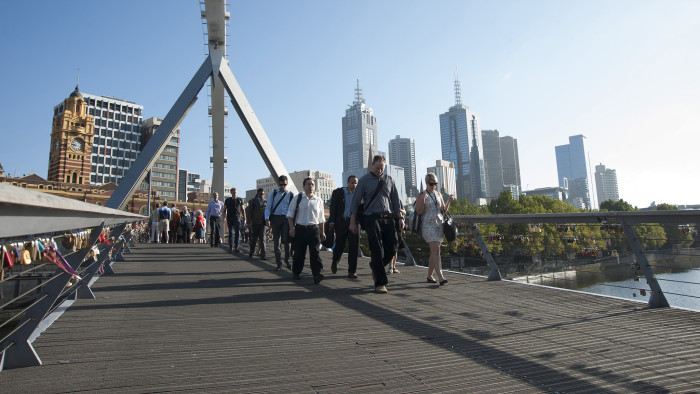Melbourne: most liveable city turns to technology

Simply sign up to the Work & Careers myFT Digest -- delivered directly to your inbox.
Population 4m
Start-ups in 2013 350
Statewide employment in ICT 91,000
For decades Melbourne has revelled in housing some of Australia’s biggest miners, banks and manufacturers. But recently it has emerged as the country’s tech capital, supporting almost a third of jobs in information and communications technology.
The case for: Melbourne is forecast almost to double in size to 7.7m people by 2050. It has six universities providing a pipeline of 4,000 ICT graduates a year. Ranked the world’s most liveable city by the Economist Intelligence Unit for four successive years, about 20,000 technology professionals have come to live here over the past five years, finding work in the 8,000 technology companies in the state of Victoria.
After years of lobbying, the federal government has published draft laws aimed at changing tax rules that prevented start-ups using stock options to attract employees.
The case against: The start-up sector across Australia is not as advanced as in the US or many European countries. Until recently it has proved difficult for early-stage companies to access venture capital and draw on practical support. That is changing as more angel investors, incubators and co-working spaces, such as Inspire9, emerge.
Australia is a relatively small market with about 23m population and a high-cost place to do business. Office rents and wages are more elevated than in many European countries.
Local heroes: Founded on Valentine’s day in 2008, 99 Designs has established an online marketplace for those seeking graphic design work. It attracted $35m in venture capital funding and is going global.
Nestled in a former industrial zone on the edge of the central business district, the York Butter Factory co-working space and incubator gives entrepreneurs a place to share ideas, collaborate and get advice on business development. Rent is A$600 a month and the Factory invests in good prospects.
Drawing inspiration from the café culture that has made Melbourne’s baristas famous, Leigh Sherman and Josh Chittick founded Pantree.co last year, developing a mobile phone app and web service that enables restaurants and cafés to consolidate interactions with suppliers. In January they both gave up their jobs, raised funding and hired five full time staff.
Getting there: Melbourne is well served by major airlines. It enjoys good links with Asian countries, particularly China.
What the locals say:
Neil Detering founded Iress, a financial market data provider, in the early 1990s with two friends. After a US company bought it he now advises start-ups.
“Back when we began there was really nothing to help us and not much of a culture of entrepreneurship and we were self-funded from day one,” he remembers. “The big difference now is a start-up community has formed and the speed at which investors are willing to put their money down and back ideas has really increased.”
Jamie Smyth
Comments